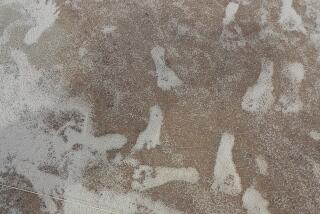Clovis: Americans come lately
- Share via
The wily prehistoric hunters long considered the first people of the Americas were almost certainly latecomers to the continent, researchers have concluded.
For 80 years, scholars were convinced that the people known as the Clovis colonized North and South America via a land bridge from Siberia, perhaps pursuing the mammoth they preyed on so skillfully. The only traces of their migration were the delicate fluted spear points and ivory tools they discarded at dozens of ancient campsites from New Mexico to Venezuela.
Using new, more precise radiocarbon data, Michael Waters at Texas A&M; University and Thomas Stafford Jr. of Stafford Research Laboratories in Colorado found that the camps are much younger than previously thought, overlapping unrelated prehistoric human sites.
Moreover, the Clovis appear to have vanished relatively soon after their arrival, making it unlikely that they could have colonized so much of North and South America, the researchers reported Friday in the journal Science.
“The Clovis are definitely not the first people in America,” said Dennis J. Stanford, curator of archeology at the Smithsonian Institution’s National Museum of Natural History, who was not involved in the study. “There is a lot going on in this period, and the Clovis are just one group of the players.”
The Clovis occupation began 13,125 years ago and lasted 200 years, about a fifth as long as previously estimated, the researchers reported.
“It seems unrealistic that [Clovis] people could burst out and make their way to the southern tip of South America in 200 years, adapting to all the different environments they would find,” Waters said.
Researchers are debating whether there were three or more earlier migrations into North America.
One group of prehistoric migrants may have traveled by boat down the coast of California; others may have crossed land bridges into Alaska and Canada from the west or from southwestern Europe from the east.






